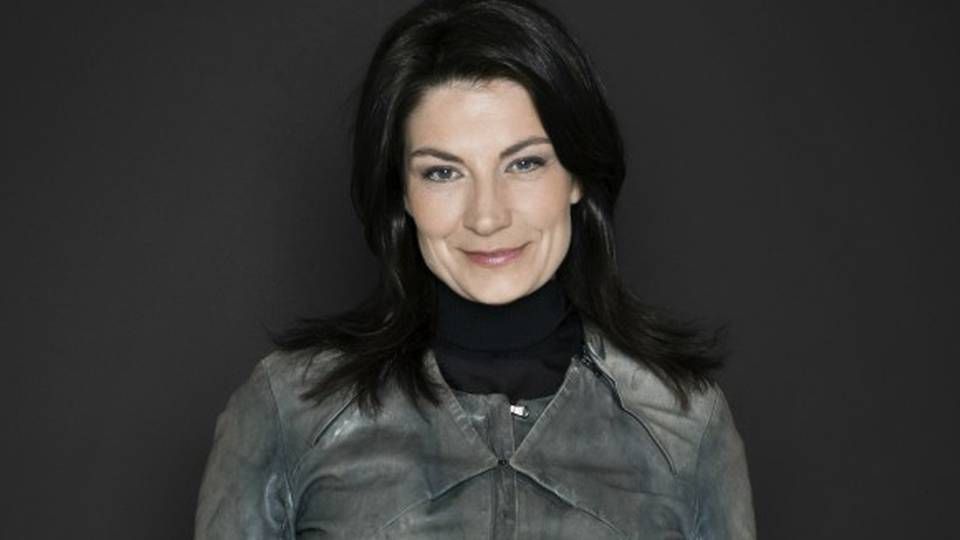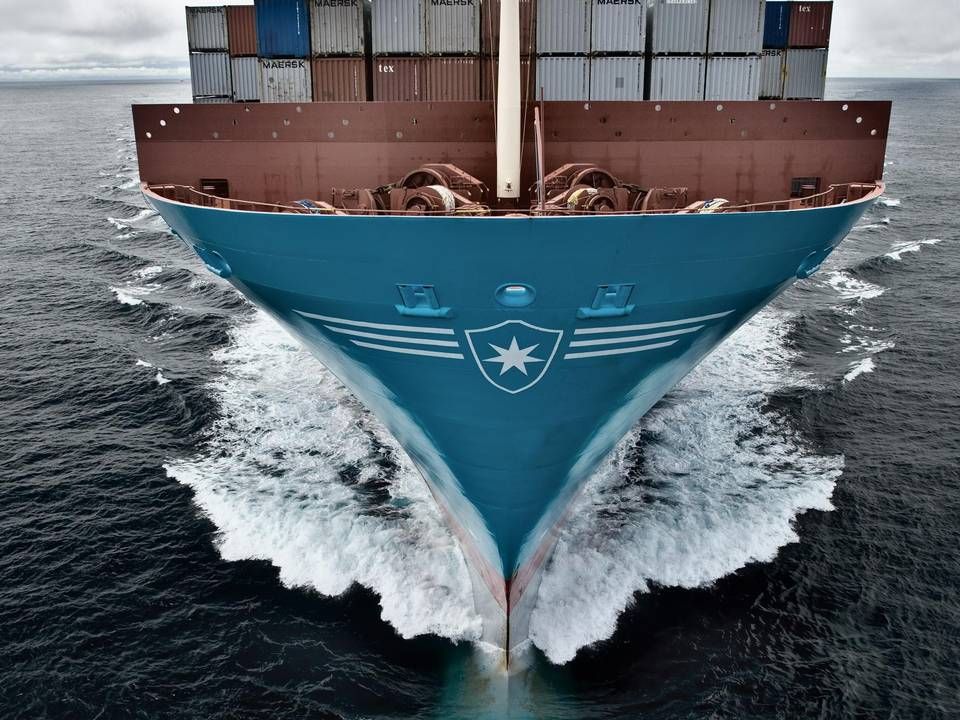Is Maersk ready to reinvent itself?

That Maersk Group Chairman Michael Pram Rasmussen states during the annual general assembly that Maersk will be a completely different company in 10-20 years is something that no one disagrees with. This is a natural part of the conglomerate's four major business units all being involved in container transport and oil. Two segments without growth potential as the global development is going now. The interesting question must then be whether Maersk will spend the next 10-20 years following in the footsteps of Denmark's pioneer of the past, East Asiatic Company, or if the company has the ability and the skills to reinvent itself.
The recently appointed board member, Jim Hagemann Snabe, expresses that "In the next stage, it will be about making the traditional companies more IT savvy and increasing their understanding of the possibilities in digital media", as he refers to Tesla as an example of the transformation of adding exponential technology to a traditional industry, as well as business target which reaches far beyond just covering the immediate customer demand.
But it is nowhere near enough just "digitalizing" Maersk, the carrier's fleet and the containers. There is a need for a revolution, and there is no doubt about that. When Maersk Line's CCO, Vincent Clerc, announced with excitement on April 5th that sensors in refrigerated containers are game changers – then the question remains how far Maersk is really into a technological development of the company. Perhaps not as far as they think. A game changer in this day and age is not just a new feature or an incremental improvement of the game. A game changer actually changes the game itself.
A Tesla on the fleet
When the newly elected board member, Jim Hagemann Snabe, encourages radical innovation and replacing a business vision with a transformational goal of contributing to solving some of the world's major challenges, the idea is intriguing. However, it is simply not radical enough to do a "Tesla" to the carrier's fleet by digitalizing. To transform the fleet for instance to CO2 neutral freight vessels in nano-material, running on non-renewable energy sources and with a digitalization degree that can update software overnight, would disrupt many industries in itself. But it does not have the potential of disrupting Maersk and ensuring the profitable growth that Maersk must want.
Digitalization does not equal disruption and exponential growth. It is simply a prerequisite for disruption and growth. When Maersk without a doubt is working towards digitalization of the business, the crucial think is for the innovation to be so radical that Maersk once again takes a quantum leap in business focus, as the company has done before when gambling on container vessels in liner service, and also when the carrier company developed its oil business. The past ten years have seen many activities be divested in order to follow the mantra of focus on the core business, and all energy is spent on reducing costs in order to compensate for declining rates and oil prices. Tongue in cheek, you could say this is maintenance of the existing business.
The pivotal task and challenge for Maersk to overcome is the development of the exponential platform which will democratize the global cargo and goods transport. A platform, which will enable carries, terminals, forwarders, producers, consumers, banks, customs authorities and other stakeholders in the global supply chain all act on and through the platform. A platform, which via an extreme customer focus will make the individual "consumer" the "king" and which was the potential to constitute the core of the "New Maersk".
The consequence for the Maersk Group's current business would be that Maersk Line and APM Terminals as some of the physical suppliers on the global platform could continue to be part of Maersk with solid cash flows, while Damco (and other forwarders) would have an even tougher time as their services would become superfluous. The platform wold contribute to increasing the degree of exploitation of vessels, containers, terminals, cargo trucks and railroads. It would dramatically reduce the major costs involved with container imbalances and thus CO2 emissions. It would be a strong tool against corruption and help with better governance and greater transparency. The available platform would be used by the new billions of consumers which enter the market helped by mobile technology, global trade would grow and wealth would increase.
Big data
The technologies which Maersk needs to work on are crowd platform, algorithms, sensors, artificial intelligence and big data in the entirety of their "Internet of things", gathered around the platform. Nano-technology and 3D printing as well as partnerships in the space industry are interesting for the development of containers and vessels, and block chain technology for secure and efficient handling of documents could make the logistic industry redundant as well as customs functions etc. It is important to be specific about what measures are needed for digitalization to not just be a "buffer" of incremental innovation.
If innovation remains internal, it will never generate the disruption that is necessary for Maersk. The real breakthrough for the company must be found in being so extremely customer focused and providing a much larger circle with access to Maersk's services and products, so that the customers' future needs are met: Today's world just wants results.
If you have to go through a middleman, then you do. But as soon as someone makes to possible to achieve results without doing so, then the middleman is redundant. Maersk's future customers do not view freight for instance as relational. It is a transactional service. The one to sovle the freight the easiest, fastest, cheapest, with the greatest access and transparency and with to do so sustainably, will win the support of consumers. The expansion must not be by purchasing new vessels at first, but by inviting other carriers and companies to offer their services on the Maersk app.
Holes in the cheese
The easiest thing in the world, as Chairman Pram Rasmussen is cited for saying, is finding the holes in the cheese. "... Fundamentally, only actions and results count. Many people can talk, analyze and find holes in the cheese". It is obvious to a lot of us, just as for the new member of the board, that Maersk and other traditional industries are lagging behind in the transformation of their industries via technology. Meanwhile, the threat from small digital rebels and their disruption of the industries, is larger and faster than ever.
But disruption gives Danish companies exactly the same opportunities to generate new business as anyone else in the world. In Denmark,we need to welcome the huge challenge. With energy, self confidence and pride in the fact that we can shake off convenience and get going. Radical innovation does not require great material resources or systems established. It does not require finding offices etc. It requires the three right people in a simple, rented room, isolated from the rest of the organization, with the own goal of disrupting Maersk with the help of exponential technologies.
The most important ingredients in disruptive innovation are located within ourselves: Courage, charismatic management, focus, creativity and the enthusiasm to get started. Now. Now, I humbly present three proposals for concrete action/results, which Maersk needs to get going and could start doing tomorrow.
1. Platform/app - cooperation
Maersk should make a platform for shipping: It functions as such, that when a company or person wants a cargo transported, the platform offers the job to a network of vessels, planes, trucks etc, which are approved by the app to supply. The receiving end chooses who should get the task, most often based on price and how the carrier or transporter is rated online. Very transparent, flexible, fast and 100 percent on the customer's terms. The advantage of the business model for Uber, AirBnb etc. is that it does not require there to be massive investments in vessels, ports, fuel and employees and so on, which Maersk and other logistics companies as well as subcontractors usually have to pay for.
The marginal costs of extra supply and demand almost equal zero on the platform. It is an "asset-light" business model, which could scale just as fast as demand. By basing Maersk services and products on information in a platform, a de facto limited resource becomes an unlimited resource. as there are no limits as to who Maersk could allow to enter the platform and take freight jobs without Maersk having to invest in vessel and so forth. If Maersk does not make this platform, someone else will.
2. Tesla on the fleet
There is a definite challenge in digitalizing the Maersk "hardware", or doing a "Tesla" on the carrier. To sail on a crowd platform as well as make business profitable. Empty containers should not be freighted around the world. Folding, lightweight containers for instance made of nano-material, all with sensors is one possibility. 3D printing containers "on-site" and reusing the material after usage is another. Mange people can probably think of more and better suggestions: What do astronauts do with empty packaging on spaceships?
Maersk already connects the world through trade, but can Maersk do so with a carbon footprint, by cleansing the oceans while sailing and so forth? Maersk needs to take radical responsibility for the pollution which container vessels cause. This can be solved. There are massive business opportunities in contributing to the UN development goals for instance.
Speed will have an increasing significance for customers across the globe. Growing transparency and connectivity increases the speed of which goods are delivered. Maersk needs to develop vessels which are three time as fast and CO2 neutral at the same time. This cannot be done internally by Maersk and their current suppliers. Maersk needs to partner up with ESA for instance, seek out collaborations with Elon Musk, Richard Branson or anyone who thinks and acts as radically as them. All stakeholders who wish to improve the world and create business at the same time. It is hard to understand how space rockets are reusable and planes built to break the barrier of sound, cars run on electricity, and we cannot create ambitious, ground-breaking results for large vessels and containers.
3. The radical innovation must happen at the edge of Maersk in the purchasing of "digital rebels" or through partnerships with them
The fundamental business must be innovated and strengthened as much as possible. But the innovation which will draw "the new Maersk" must be established at the edge of the company - far away from the headquarters in Copenhagen - under its own CEO. Maersk's strong organizational culture is like the body's immune system, always trying to fight radical innovation that might pose a threat to the existing business model. The purpose of organizational culture is to maintain and to protect against risks.
All organizations include "self-starting" rebels - also Maersk. An "annoying" business agent with visions and ideas for radically innovating the business. This would be one of the agents who should be deployed in the autonomous disrupting unit. Another should have the complete technological expertise. They should operate with their own KPIs (Key Performance Indicator) and be allowed to make mistakes. Lots of mistakes.
Related articles
Maersk Line looking to beat reefer peers with GPS
For subscribers
Bleak Maersk Line forecast takes analysts by surprise
For subscribers
Maersk maintains strategy in spite of oil strain
For subscribers





















